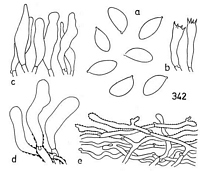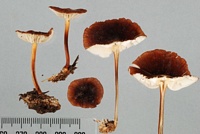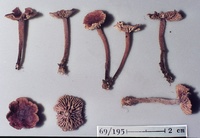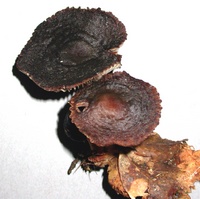|
 Collybia vinacea Collybia vinacea
SynonymsCrinipellis vinacea
BiostatusPresent in region - Indigenous. Endemic
Images (click to enlarge)
Caption: 342-Collybia vinacea: a. spores; b. basidia; c. cheilocystidia; d.
caulocystidia; e. cuticle. | 
Caption: Collybia ? vinacea. Stipe perhaps more finely fibrillose than it should be.
Owner: Herb PDD | 
Caption: ZT69-195
Owner: E. Horak: © Creative Commons Attribution-Noncommercial 3.0 New Zealand | 
Owner: P. Leonard |  |
Article: Stevenson, G. (1964). The Agaricales of New Zealand: V. Kew Bulletin 19(1): 1-59.
Description: Pileus 1-2.5 cm diam., vinaceous brown, plano-convex becoming broadly concave with a waved, striate, and somewhat grooved margin, finely fibrillose; flesh thin, vinaceous brown. Gills adnexed to adnate, pale vinaceous, moderately distant. Stipe 2-3 cm x 1-2 mm, vinaceous above, blackish vinaceous towards base, flecked with fine fibrillose scales, tough, hollow. Spores 7-8 x 3-4 µm. non-amyloid, thin-walled; print white. Hymenophoral trama non-amyloid. Cuticle of loosely woven hyphae 5-8 µm diam., with clamp connections, and with irregular amyloid to pseudo-amyloid thickenings.
Habitat: In litter and on fallen rotting log, Wakapuaka, Nelson, 14.4.1956, Stevenson (type).
Article: Horak, E. (1971). A contribution towards the revision of the Agaricales (Fungi) from New Zealand. New Zealand Journal of Botany 9(3): 403-462 (http://www.rsnz.org/publish/abstracts.php).
Description: Crinipellis vinacea Stevenson (29 D) Fig. 27 = Collybia vinacea (Stevenson)
comb. nov. Basionym: C. vinacea Stevenson, Kew Bull. 19: 44, 1964)
Spores elliptical, hyaline, neither amyloid nor dextrinoid, smooth, 7-8.5 X 3.5-4 µ.
Cheilocystidia numerous, fusoid or ampullaceous, thin-walled, 25-40 X 5-9 µ.
Cheiocystidia similar. Cuticle consisting of irregularly interwoven, cylindrical,
externally pigmented hyphae, sometimes branched at the tips, without any
dermatocystidia or hair-like elements, clamp connections present.
|